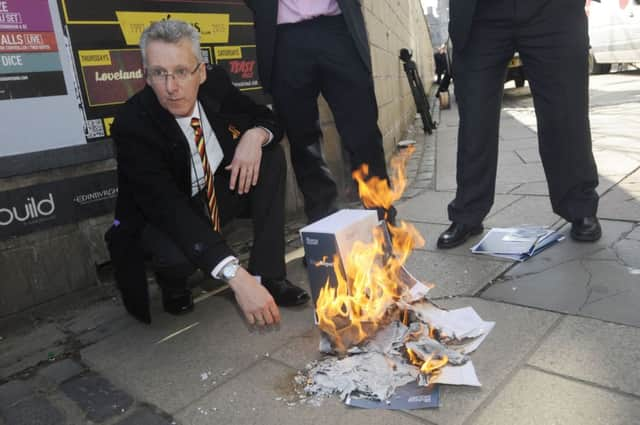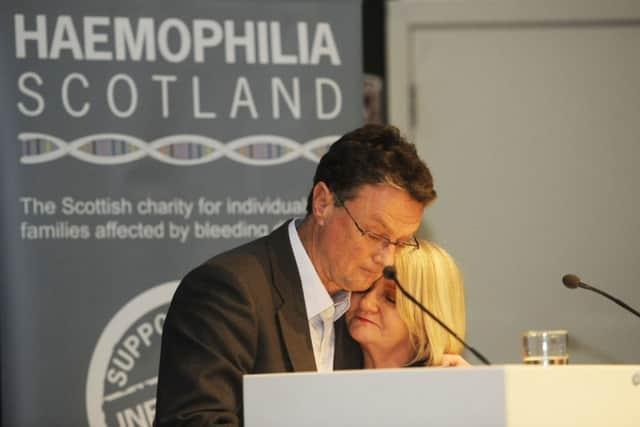Blood scandal victims condemn Penrose inquiry


Thousands of NHS patients received an apology yesterday from the UK and Scottish governments over blood contaminated with hepatitis C and HIV/Aids.
But in a display of their anger, campaigners burned a copy of the Penrose inquiry report outside the National Museum of Scotland in Edinburgh where it was delivered, and a £25 million UK government compensation package was branded “an insult”, leading to the prospect of a raft of new legal cases.
Advertisement
Hide AdAdvertisement
Hide AdHaving cost at least £11.3 million and taken six years to complete, it only made one recommendation and was reluctant to apportion blame, angering victims.


The Scottish Government accepted Lord Penrose’s solitary recommendation to test patients who had a blood transfusion before September 1991 for hepatitis C if they have not already been examined.
The inquiry discovered that thousands of people, some of whom may still be unaware, were infected with life-threatening conditions hepatitis C and HIV through NHS blood products in the 1970s and 80s.
But its overall conclusion was that little could have been done differently to prevent infection. Lord Penrose said the inquiry had to take into account the “conditions that had prevailed at the time” rather than judge by today’s standards.
Campaigners from south of the Border came to Edinburgh to join their Scottish counterparts for the launch of the report.
When Lord Penrose’s statement was read by the inquiry secretary Maria McCann, angry patients shouted “whitewash”. Others walked out in disgust.
Patrick McGuire, from Thompsons
Solicitors, who is acting for victims, described the £25m compensation announced by the Prime Minister as “gesture politics”.
“£25m would not even be close enough in Scotland,” Mr McGuire said.
Advertisement
Hide AdAdvertisement
Hide AdThe angry scenes continued outside, where campaigners burned a copy of the five-volume report.
Glenn Wilkinson, from the Contaminated Blood Campaign, said: “What it says is that this is all that this Penrose inquiry is worth. It’s just a pile of ashes as far as I’m concerned.
“I feel totally devastated. It was obvious from the atmosphere in the room there that everybody is shocked. We didn’t expect the world, we didn’t expect this to be the final solution for this campaign, but we certainly expected a lot more than that.
“It has created a new level of disappointment.
“Hopes were very high that, because it had taken so long, we would have some answers, and I don’t think we’ve had a single answer from what was said in there.”
Lorna Rusling, whose husband David died from hepatitis C as a result of contaminated blood products, said: “To me it just seems like he [Lord Penrose] spent £12m and six years coming out with nothing that hasn’t been heard before.”
According to the Penrose report, around 2,500 patients were infected with hepatitis C through blood transfusions and there were a further 478 cases of the disease being passed on through bleeding disorders.
In all, there were 60 cases of HIV infection in people with bleeding disorders and 18 blood transfusion patients infected with the deadly virus.
Lord Penrose, who is seriously ill in hospital, was unable to attend the publication of his investigation, which found that more should have been done to screen blood and donors for hepatitis C in the early 1990s and that the collection of blood from prisoners, many of whom were drug users, was “inadvisable” and should have stopped earlier.
Advertisement
Hide AdAdvertisement
Hide AdA decision by the advisory committee on the virological safety of blood to recommend the introduction of screening should have been taken by May 1990 rather than be delayed until November 1990. Had the then Scottish secretary, Malcolm Rifkind, been alerted to the situation by civil servants, screening could have started earlier.
The report found that patients were not adequately informed of the risks because of the paternalistic attitude of doctors at the time.
But the inquiry, which looked at the issue from 1974 to 1991, concluded that nothing more could have been done to prevent the transmission of HIV.
It said that actions taken in Scotland following the emergence of HIV/Aids “held up well” compared to other countries.
The inquiry, commissioned by Nicola Sturgeon when she was health secretary, meant that Scotland is the only part of the UK to conduct an investigation into tainted blood.
Collette Wintle, a haemophilia patient who was infected with hepatitis C after treatment at Glasgow Royal Infirmary, claimed the report had shown “more sympathy for the clinicians rather than the victims themselves”.
She added: “Not one single person is going to be held to account or jailed for this. Where’s the justice in that?”
Lord Penrose found 60 haemophiliacs were infected with HIV including 21 boys treated at the Royal Hospital for Sick Children at Yorkhill in Glasgow. Eight of the 21 boys have since died. Twenty-three patients acquired HIV through haemophilia therapy at Edinburgh Royal Infirmary and three through haemophilia treatment in Aberdeen. Two were known to have died by the time of the hearings.
Advertisement
Hide AdAdvertisement
Hide AdAt Glasgow Royal Infirmary, 12 haemophilia patients were infected with HIV, of whom ten have died. The final patient was thought to have been infected at a non-specialist centre.
At Prime Minister’s Questions, David Cameron confirmed that £25m would be provided in the short term to help patients.
The Prime Minister said: “It is difficult to imagine the unfairness people must feel at being infected with hepatitis C or HIV as a result of a totally unrelated treatment within the NHS. And to each and every one of those people, I would like to say sorry on behalf of the government for something that should not have happened.
“No amount of money can fully make up for what did happen, but it is vital that we move as soon as possible to improve the way that payments are made to those infected by this blood.”
At Holyrood, health secretary Shona Robison said: “On behalf of the NHS and government in Scotland, I would like to say sorry to everyone who has been affected by this terrible tragedy.”
FOLLOW US
SCOTSMAN TABLET AND MOBILE APPS